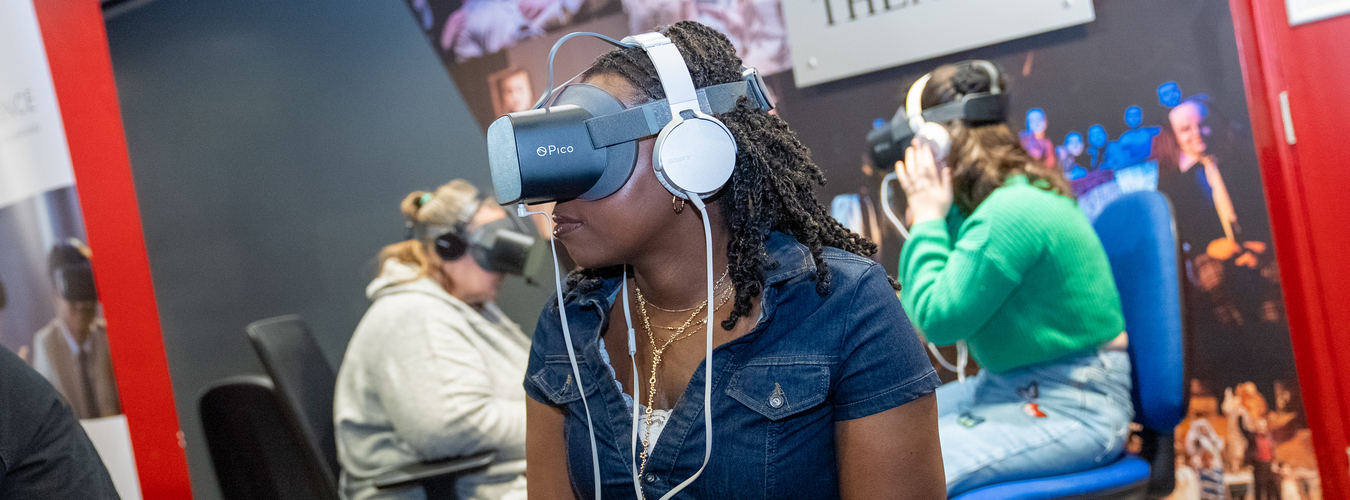Researchers at Queen’s University Belfast are pioneering the use of immersive virtual reality (VR) to help professionals, policymakers and the public better understand the lived experience of mental abuse and coercive control and Relationship and Sexuality Education.
Through cinematic VR storytelling, spatial sound, and first-person perspectives, Queen’s is developing innovative tools that bring invisible forms of abuse and the complexities of sexual consent into clearer focus. This work aims to improve training for health, social care and justice professionals and contribute to more empathetic, effective responses to one of society’s most hidden forms of harm.
Tune in now: Research to Reality: Roundtables
Join us for an engaging roundtable discussion featuring four academics from Queen's University Belfast: Lucy Baxter, Professor Paul Best, Professor Franziska Schroeder and Professor Roger Woods. Hosted by former BBC journalist Mark Devenport, this conversation delves into the overarching theme of "Using Emerging Technologies to Improve Lives."
Research Challenge
Mental abuse and coercive control often leave no visible marks, making them difficult to identify, communicate and address. Traditional training methods may not fully convey the psychological impact of emotional manipulation, shame, isolation or fear. Teaching sensitive topics in Relationship and Sexuality Education (RSE) is a serious challenge in the North of Ireland. Queen’s researchers recognised a need for new methods to:
- Make the internal experience of abuse more legible.
- Enable facilitation of sensitive topics within RSE.
- Enhance professional understanding and empathy.
- Support early intervention by improving recognition of warning signs.
- Explore new therapeutic tools for those affected.
Our Approach
Drawing on strengths in film practice, creative technologies, mental health research and interdisciplinary collaboration, Queen’s has developed a series of immersive VR-based tools that represent the psychological and emotional experience of abuse and explore the subtle nuances of sexual consent.
A key strand of this work has been produced through the Centre for Technological Innovation, Mental Health and Education (TIME), which brings together expertise from film, psychology, social work, sound design and digital innovation.
Two notable examples create VR drama narratives. Mental Abuse Matters is an experience that places the viewer inside the perspective of someone experiencing mental abuse, and The Afters tells a story about sexual consent for young people from two perspectives: young man and a young woman. Built using cinematic VR, carefully choreographed narrative sequences and immersive soundscapes, these projects demonstrate how creative virtual environments can evoke feelings such as dread, shame or dissociation.
This VR research is led by Lucy Baxter whose practice-based research within the TIME Centre has informed new methods for depicting trauma and internal emotional states using 360° film and animation. The VR production involves contributions from creative practitioners including Retinize, Hanna Slattne and Gavin Peden and the wider research includes post-doctoral researcher Alex Lucas.
These VR projects have secured support from creative innovation partners including Future Screens NI, AHRC and Qubis, and have been developed in partnership with Queen’s experts working in mental health, social care and domestic abuse.
“Using immersive VR, we can place people in the shoes of someone experiencing coercive control and allow them to feel what is otherwise invisible. This helps professionals understand the emotional reality behind mental abuse in a way that traditional training cannot.”
- Dr Lucy Baxter
What impact did it make?
1. Transforming Professional Training
The immersive VR experiences are being used to support training for:
- Social workers
- RSE teachers
- Youth community practitioners
- Domestic abuse support staff
- Health and mental-health professionals
- Justice system practitioners
By offering a safe yet realistic simulation of psychological abuse, the tool helps professionals better understand victim experiences, strengthening their capacity to recognise subtle signs and respond appropriately.
2. Raising Public Awareness
Public engagement activities and media coverage have helped highlight the realities of coercive control, challenging misconceptions and sparking conversations about emotional abuse as a serious societal issue. The work supports broader efforts to destigmatise conversations about sexual consent, trauma and mental wellbeing.
3. Innovating in Mental Health Intervention
These projects contribute to emerging models of VR empathy training, exploring how immersive storytelling can complement psychological support. It demonstrates how creative practice can be integrated into mental health innovation pipelines.
4. Supporting Policy and System-Level Change
By improving awareness among frontline professionals and showcasing new training technologies, the research aligns with national priorities around tackling domestic abuse and strengthening safeguarding frameworks. It has potential to influence how training programmes, service providers and justice systems integrate immersive learning.
5. Driving Creative Innovation and Knowledge Exchange
The project strengthens Queen’s leadership in immersive media research, contributing to new enterprise activity, including through Createch companies, and building capacity in Northern Ireland’s growing digital creative sector.
Our impact
Impact related to the UN Sustainable Development Goals
Learn more about Queen’s University’s commitment to nurturing a culture of sustainability and achieving the Sustainable Development Goals (SDGs) through research and education.











